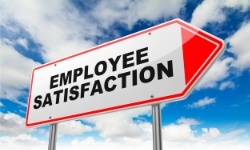 When staff enjoy their work and job roles are clearly defined, this inevitably feeds back into company performance. Marketing teams interact more effectively with clients, suppliers are treated better and relations on the production line go more smoothly. Any manager will attest to the value of team building and job satisfaction as well.
When staff enjoy their work and job roles are clearly defined, this inevitably feeds back into company performance. Marketing teams interact more effectively with clients, suppliers are treated better and relations on the production line go more smoothly. Any manager will attest to the value of team building and job satisfaction as well.
But how can managers create a sustainable basis for employee satisfaction? One way is to put systems in place that make sense, streamline processes, flag up any issues as they arise and allow people to work smarter. In this sense, Enterprise Resource Planning (ERP) can contribute to the happiness of your workforce in a number of ways.
Well Defined Job Roles Lead to Happy Workers
One of the worst things about working in poorly organised companies is that work is duplicated, while many people do not seem aware of their specific role. This often arises when firms expand without planning ahead, or when different departments pursue their own actions without it linking to a central strategy.
One of the best routes to employee satisfaction is by tightly defining job roles, so that every member of staff knows what they and their colleagues are supposed to do. This is even better if the staff member knows exactly how their job contributes to the firm’s overall strategy. ERP can help to achieve both goals.
Allow Client Facing Staff to Do Their Jobs Well
Nobody enjoys interacting with clients without the information required to serve them properly. If sales and marketing teams are fed poor quality information about production times or invoicing, they may struggle to provide a good service, damaging their own morale.
With the right IT package in place, firms can put all of their information at the disposal of client facing staff, giving them total awareness of any problems that arise. Couple this with a strong Customer Relationship Management (CRM) strategy - everyone benefits.
Raise Efficiency and Improve Processes
ERP can increase efficiency, revenues and profits but, initial implementation requires a team effort and many staff members may need to radically alter their practices.
The end result for each individual should be more skills and increased satisfaction, and with processes more streamlined previous excessive workloads or duplicate tasks can be decreased or eliminated. Staff may experience the implementation of ERP as a challenge, but within a short period workloads and processes will be improved. As firms become more efficient, revenues and profits tend to follow which can be shared with staff.
Use Information to Reward Good Work
The information collected by ERP systems is useful for many things – from running routine compliance and auditing tasks to overhauling a complete product range. One way of using the system is to thoroughly assess staff performance. HR professionals can use ERP tools to find out which employees are excelling, and they can distribute rewards accordingly.
The money saved by implementing tools like ERP can also be put to good use, whether by arranging staff away days, bonuses or improving the working environment – all of which tend to raise employee engagement and happiness.
Even if you don’t intend to invest in ERP as a means of raising employee satisfaction, it is often a side effect of a strong implementation. An efficient workforce tends to be a happy one, so don’t be surprised when the working atmosphere improves.



.png?width=120&height=120&name=MicrosoftTeams-image%20(4).png)


